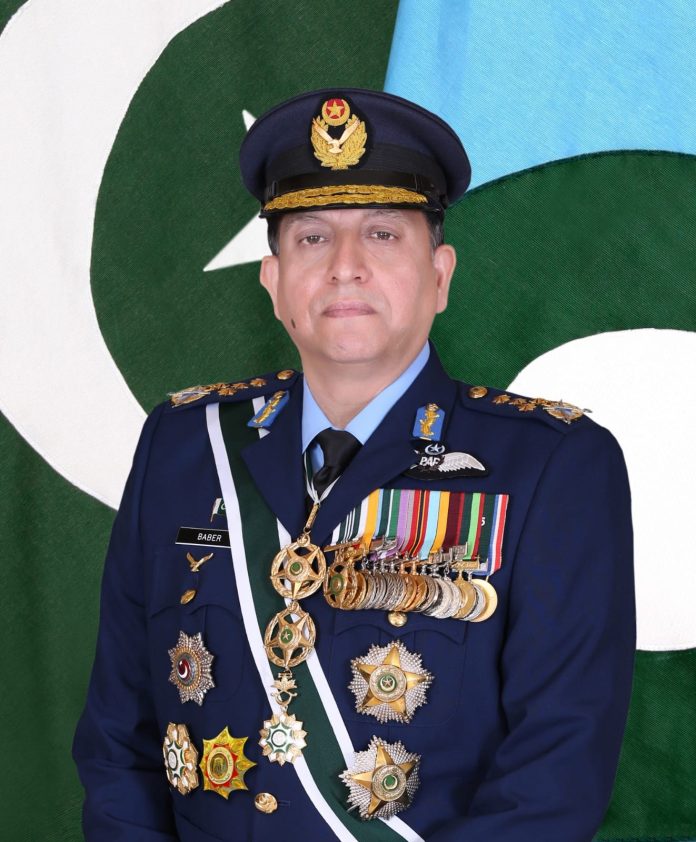Izmi Herlani
Whenever our history has looked uncertain and our skies have been threatened to darken, Pakistan Air Force hasn’t just braced for the storm, it has become the storm. In just four transformative years, PAF has reshaped its destiny, turning the tide of regional power with visionary reforms, fearless innovation and cutting-edge operational might. PAF’s unprecedented progress in the past few years is no ordinary chapter in military evolution, it’s a revolution in flight led from the front by Air Chief Marshal Zaheer Ahmed Baber Sidhu. At a time when conventional thinking would have called for cautious upgrades, the Air Chief dared to dream bigger. He ignited a movement, a renaissance that turned Pakistan’s air arm into a symbol of unmatched resolve, relentless precision and rising indigenous power. Under his command today Pakistan Air Force is not just defending airspace—it’s Redefining it.
When ACM Zaheer Ahmed Baber Sidhu took charge of PAF in 2021, the regional balance was tilting dangerously. Rivals were flaunting 4.5+ generation fighters, cyber tools and space-based dominance. But rather than mirroring their playbook, the Air Chief tore it up and rewrote it. With a deep understanding of contemporary warfare’s new frontiers, he launched an ambitious blueprint for Full Spectrum Multi-Domain Dominance. This wasn’t just a military jargon, it was a rallying cry to unify air, space, cyber and electronic warfare into one lethal responsive force, knitting a Kill Web that resulted into a humiliating defeat to Indian aggressive designs. Experts believe that ACM Sidhu has pushed the envelope far beyond traditional air combat, bringing in real- time intelligence, networked ISR and agile electronic warfare capabilities into PAF’s operational framework at an unprecedented pace. The results? Monumental. PAF hasn’t just leveled the playing field rather it has completely turned it in its favor.
On the fateful night of 06–07 May, when Pakistan’s sovereignty was brazenly challenged, Pakistan Air Force didn’t blink. What unfolded was more than retaliation, it was a masterclass in modern warfare. From satellites to radars, electronic jamming to precision strikes, PAF unleashed a perfectly synchronized ballet of technology, tactics and tenacity. The response was swift, stunning and surgical. A 7–0 clean sweep against Indian aggression sent shockwaves across the region, rewriting rules of deterrence and reasserting PAF’s supremacy in the skies. It was No drama, No grandstanding but just Mission Excellence. While Pakistan’s adversary invested in headline-making hardware and flashy narratives, PAF chose a different path, Doctrine over Drama. PAF’s every sortie was backed by intelligence, it’s every move rehearsed through simulation and it’s pilots flew with real-time updates with unmatched situational awareness. This wasn’t
Combat; it was Choreography. This disciplined approach made all the difference. During the conflict PAF didn’t just fly better platforms, it flew smarter missions. With satellite- linked targeting, cyber protection, smart use of UCAVs & Killer Drones backed by electronic warfare dominance, Pakistan Air Force orchestrated the air battle in a theater few even understood.
The J-10C’s induction with its PL-15 BVR missiles wasn’t just about keeping up with India’s Rafales. It was about regaining the edge and doing it on PAF’s terms. But the transformation wasn’t confined to cockpits. The real leap came in connecting every domain: Air, Space, Cyber, Unmanned Force and Electronic Warfare. With a seamless kill chain, advanced data-sharing and AI-enabled decision support, PAF has proved to be an integrated force of the future today. Indigenous UAVs, electronic warfare platforms and network-centric operations have become the backbone of this modernization. It’s a full-spectrum shift, not just in how PAF fights but how it thinks.
If there’s a cornerstone of this revolution, it’s Self-reliance. In a world where technology can be withheld at will, PAF turned inward and upward. Air Chief Marshal Sidhu’s push for indigenous innovation wasn’t a luxury; it has turned out to be a lifeline. Enter National Aerospace Science and Technology Park, Pakistan’s bold leap into the future and one will witness a convergence point for academia, industry and government. NASTP isn’t just a lab for innovation; it’s evolved into a launchpad for Strategic Autonomy. In pursuance to the vision of the Air Chief, with homegrown technologies, talent development and thousands of high-tech jobs in the pipeline, Pakistan is no longer a buyer; it’s on its way to becoming a builder and eventually an exporter of advanced defence solutions. The transformation of Pakistan Air Force under ACM Zaheer Ahmed Baber Sidhu isn’t just a military milestone—it’s a national resurgence. Where once the future looked uncertain, today it looks unstoppable. From rearming the fleet to reshaping the doctrine, from building indigenous capacity to outclassing adversaries in real combat, PAF now stands as a fortress in the skies and a beacon of resilience on the ground. And above all, it soars as a symbol of Pakistan’s ingenuity, strength and unshakable will. So when the world looks up and sees PAF flying, they’re not just witnessing its aircraft in motion, they’re witnessing a Nation in Ascension.

















